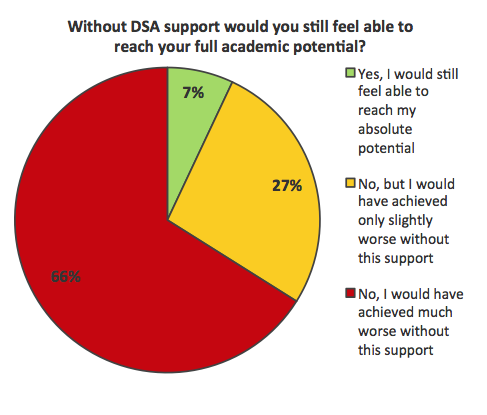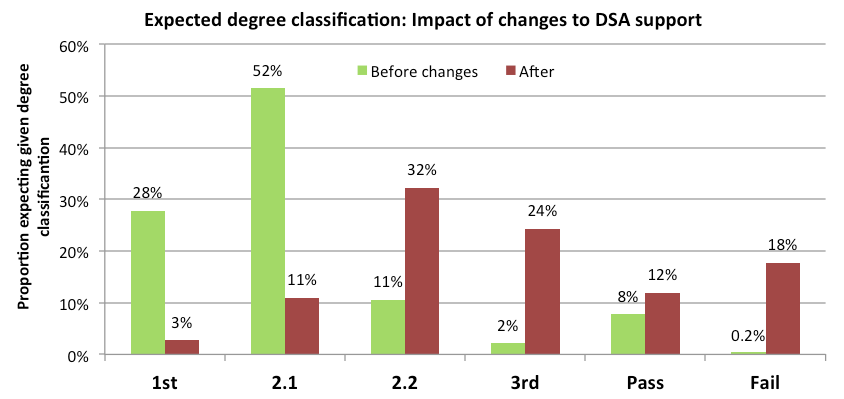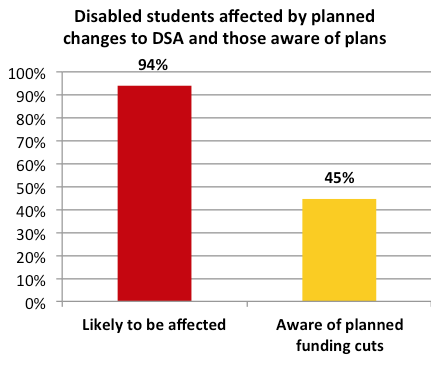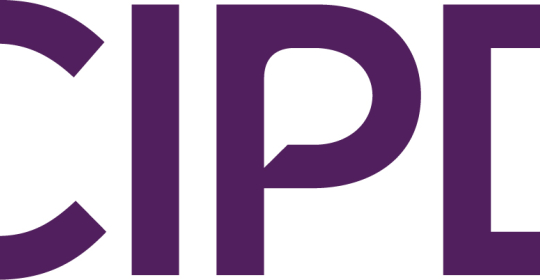- Nine in ten disabled students (93%) may no longer reach their full academic potential after cuts to support
- Changes to Disabled Students Allowances would mean fewer disabled people in the workplace, say 87%
- Only 14% would achieve 2:1 or better (down from 80% currently), while 2:2 is set to be the most common degree for disabled people
- Funding cuts will affect 94% of those currently receiving DSA, but majority (54%) not even aware of plans
Students’ ability to reach their full potential will soon be dependent on whether they have a disability if current government plans go ahead, according to a poll of over 500 disabled students carried out by disability specialists Randstad Student Support.

Changes to sharply restrict funding for Disabled Students Allowances (DSA) are set to come into force from as early as September 2015.
However, more than nine in ten students currently receiving DSA funding (93%) say they would be unable to reach their full academic potential without the support of this scheme.
Two thirds (66%) say that without DSA allowances they would have achieved much less academically, while a further 27% would have managed only slightly worse without support.
Only 7% of disabled students believe they would still be capable of reaching their full potential.
Impact on qualifications and the workplace
Those with disabilities would also be less likely to achieve the best qualification levels. Currently, 80% of those in receipt of Disabled Students Allowance expect a 2:1. However without the support of DSA allowances, this could fall by a factor of more than five, to just 14% achieving a 2:1 or first class degree.
Moreover, workplace diversity could also be negatively affected. When asked if the withdrawal of central funding for some Disabled Students' Allowances at universities could ultimately lead to fewer people with disabilities in the workplace, 87% said there would be fewer people with disabilities in work.
Only 9% believe there would be no effect on workplace diversity, while just 4% said there would be a positive impact on the number of disabled people in the workforce.
Victoria Short, managing director of Randstad Student and Worker Support, comments, “Original intentions for these changes must have been well-meaning. But the application of this policy has exceeded its initial aims and could now be extremely damaging – not to mention extremely costly.
“Modernisation is an entirely different policy, and probably overdue. But these changes go beyond evidence-based modernisation, far beyond a pragmatic evolution of the DSA system – to the very heart of what it means to provide access for everyone to higher education.”

Access to university
Less than half of students receiving DSA (40%) are certain that they would still have attended university without the support. A further one-third (32%) are unsure, while more than a quarter of disabled students (28%) say they would not have attended higher education if they had not been eligible for Disabled Students’ Allowances.
Two thirds of disabled students (66%) say that life in higher education is more expensive for those with some form of disability – out of which 35% say the difference is “substantial”. Just under one-third (32%) believe life at university is equally expensive regardless of disability, while only 2% think it is in fact cheaper to live as a disabled student.
Four in five students (79%) currently eligible for DSA say there is at least some chance of them dropping out of their courses if they become ineligible for this support. Of these 36% describe themselves as “slightly more likely” to drop out and 43% say they would be “much more likely” to end their studies early. Only the remaining 21% are certain they would complete their current studies without Disabled Students Allowance.

Poor awareness despite widespread impact
Analysis of respondents requiring different types of assistance reveals that 94% of all students supported by DSA under the existing system are likely to be affected by these changes, with the remainder of just 6% likely to see no change.
However, just 45% of those surveyed said they were aware of current plans to dramatically reform the eligibility and provision of DSA support.
Most significantly, while specific learning difficulties are a central focus of the planned reforms, this type of support was also the most in demand – with 46% of DSA students receiving some level of dyslexia support.
Universities alone cannot fill the gap
Government plans to reorganise Disabled Students Allowances centre on allocating responsibility to fund support to Higher Education Institutions (HEIs) themselves.
While there is no publicly available assessment of the capacity of institutions to provide the same level of support, students themselves tend to be far from optimistic. Of those surveyed only 4% believe their university has the resources to provide the same level of support without central government funded DSAs.
Victoria Short concludes, “Equality of opportunity is why schemes like DSA exist. So any improvements should be aimed at making that mission more effective. Unfortunately there doesn’t appear to have been a real public debate about the impact of these changes on those terms – or a determined effort by the departments involved to build a viable alternative.
“Shifting responsibility to universities is much more significant than it sounds. If disabled students must judge universities not by their teaching reputation, but on the likelihood of receiving the necessary support to study, then disabled students face a fundamentally different choice to others. This matters when choosing where to study – and whether to attend higher education in the first place.
“Ministers must convene an urgent rethink from first principles, to agree what these changes really intend to achieve. There is a very real danger that current proposals for DSA will discriminate against disabled people accessing higher education and ultimately limit their working opportunities. The changes will also impact the poorest hardest.
“In light of that, we are keen to work with the Government to come up with a workable alternative which ensures that disabled students can access the support they need to reach their full potential.”






